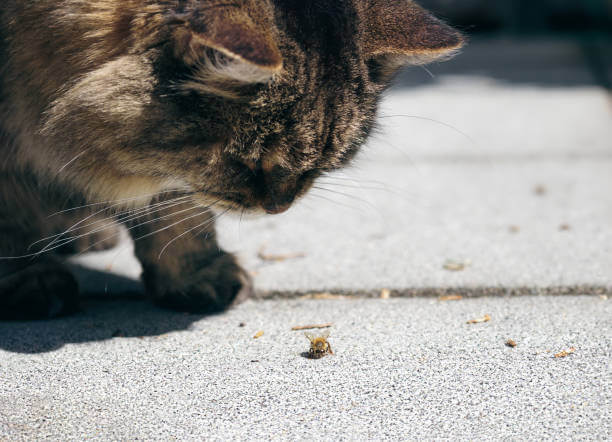Introduction
Treatment for Cats Stung by Bees or Wasps. During the warmer months, cats enjoy spending time outdoors, chasing after insects and exploring their surroundings. However, this can put them at risk of being stung by bees or wasps. A sting from these insects can be painful for humans and even more dangerous for our feline companions. As a responsible cat owner, it is important to know how to handle a cat that has been stung by a bee or wasp.

There are several home remedies and over-the-counter treatments that are not recommended by veterinarians. In this article, we will discuss the veterinarian-approved treatment for cats stung by bees or wasps to ensure the safety and well-being of your furry friend.
Understanding the Sting
A bee or wasp sting is caused by the insect’s venom being injected into the skin. The venom contains proteins and other substances that cause allergic reactions in humans and animals. For cats, this can lead to swelling, pain, and discomfort at the site of the sting.
There are two types of reactions that a cat may have to a bee or wasp sting: a local reaction and a systemic reaction. It is important to recognize the symptoms of both types of reactions to provide the appropriate treatment.
Signs of a Cat Being Stung
It is important to keep an eye on your cat while they are outdoors. If you notice any of the following signs, your cat may have been stung by a bee or wasp:
- Swelling around the area of the sting
- Redness and irritation
- Limping or difficulty walking
- Excessive licking or scratching at the site of the sting
- Difficulty breathing or excessive panting
If you observe any of these signs, it is important to act quickly and provide your cat with proper treatment.
First Aid for Cat Stings
The first thing you should do when your cat has been stung by a bee or wasp is to remove the stinger if it is still present. This can be done with a pair of tweezers or by gently scraping it off with a credit card. Next, clean the area with soap and water to prevent infection. Applying an ice pack wrapped in a towel can also help reduce swelling and pain.
Some home remedies are often recommended, such as applying honey or baking soda to the sting. However, these treatments have not been proven to be effective and may even cause further irritation. It is best to seek advice from a veterinarian for proper treatment.
Veterinarian-Approved Treatment for Cats Stung by Bees or Wasps
If your cat is showing signs of a local reaction, a veterinarian-approved antihistamine may be prescribed to reduce swelling and pain.
For more severe reactions or if your cat shows signs of a systemic reaction, immediate veterinary care is necessary. Your veterinarian may administer epinephrine and steroids to counteract the allergic reaction.
Prevention
Prevention is always the best approach when it comes to keeping your cat safe from bee and wasp stings. Here are some tips to minimize the risk of your cat getting stung:
- Keep garbage cans tightly sealed to prevent attracting bees and wasps.
- Avoid leaving food or water bowls outside, as they can also attract these insects.
- Keep your cat away from gardens and areas with flowering plants where bees and wasps may be present.
- Use insect repellents or traps to deter insects from your home and yard.
- Consider keeping your cat indoors during the height of bee and wasp season.
Natural Remedies
Several natural remedies can help alleviate the discomfort and inflammation caused by a bee or wasp sting. These include:
- Aloe vera gel: The cooling properties of aloe vera can soothe the irritated skin and reduce swelling.
- Witch hazel: This natural astringent can help relieve pain and itching when applied topically to the sting site.
- Apple cider vinegar: Diluted apple cider vinegar can help neutralize the venom and reduce swelling.

Over-the-Counter Medications
If your cat is experiencing significant pain or discomfort, you can give them a small dose of over-the-counter antihistamine such as diphenhydramine. However, it is important to consult with your veterinarian for proper dosage and to ensure that it is safe for your cat. There are also pain relievers that are specifically formulated for cats that can help ease their discomfort.
When to Seek Veterinary Care
In some cases, a cat’s reaction to a bee or wasp sting can be severe and require immediate veterinary attention. If you notice any of the following symptoms, take your cat to a veterinarian as soon as possible:
- Difficulty breathing
- Extreme swelling or hives
- Weakness or collapse
- Vomiting or diarrhea
Prevention Tips
Preventing your cat from being stung by a bee or wasp is the best course of action. Here are some tips to help protect your feline friend:
- Keep an eye on your cat while they are outdoors and try to limit their exposure to areas with high insect activity.
- If you have a beehive or wasp nest on your property, take necessary measures to remove it safely.
- Avoid using scented products on yourself or your cat while spending time outdoors as these can attract insects.
- Consider using a natural insect repellent on your cat’s outdoor gear.
What Happens When a Cat is Stung by a Bee or Wasp?
When a cat is stung by a bee or wasp, the severity of their reaction depends on several factors such as the location and number of stings, as well as their sensitivity to insect venom. In some rare cases, cats can also experience anaphylactic shock which requires immediate medical attention. Certain breeds may be more prone to severe reactions, such as Siamese and Oriental breeds. Therefore, it is important to monitor your cat closely after a sting and seek veterinary care if necessary.
FAQS
Q: Can a cat die from a bee or wasp sting?
A: While rare, it is possible for a cat to experience severe reactions and even death from multiple stings or anaphylactic shock. That’s why it’s important to seek veterinary care if you notice any concerning symptoms.
Q: How can I tell if my cat is allergic to bee or wasp stings?
A: Cats can develop allergies to bee and wasp stings, just like humans. If your cat has had a previous reaction to a sting, it is important to consult with your veterinarian for proper testing and treatment.
Q: Is there anything I can do to prevent my cat from being stung?
A: While it may not be possible to completely prevent your cat from being stung, you can take preventative measures such as keeping an eye on them while outdoors and using natural insect repellents.
Q: Can I use human medications for my cat’s sting?
A: It is important to consult with your veterinarian before giving your cat any over-the-counter medications. Some may not be safe for feline use and could potentially do more harm than good.
Q: How can I make sure my cat stays safe while exploring outside?
A: Supervising your cat and monitoring their outdoor activities is the best way to keep them safe from bee and wasp stings. Limiting their exposure to areas with high insect activity and using natural repellents can also help.
Conclusion
As a responsible cat owner, it is important to know how to treat and prevent bee or wasp stings in your feline friend. By following the tips and remedies mentioned in this article, you can help reduce their discomfort and keep them safe from severe reactions. However, if you notice any concerning symptoms, do not hesitate to seek veterinary care for your beloved pet.
Remember that prevention is key when it comes to protecting your cat from insect stings. Keep a watchful eye on them while they are outdoors and take necessary precautions to keep them safe. So, if you suspect that your cat has been stung by a bee or wasp, follow these tips and consult with your veterinarian for further guidance.
